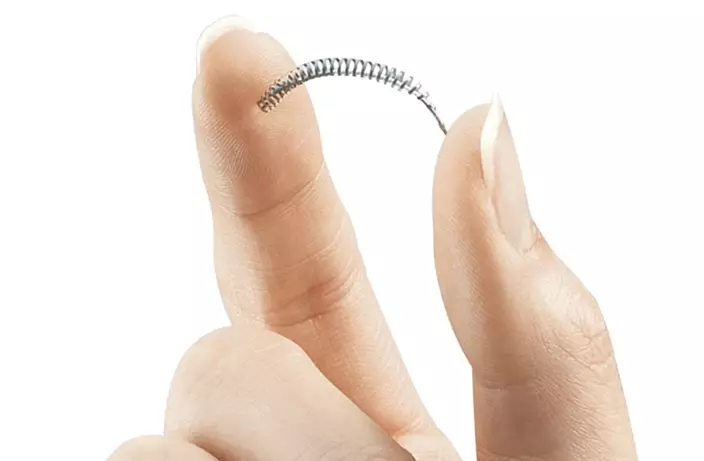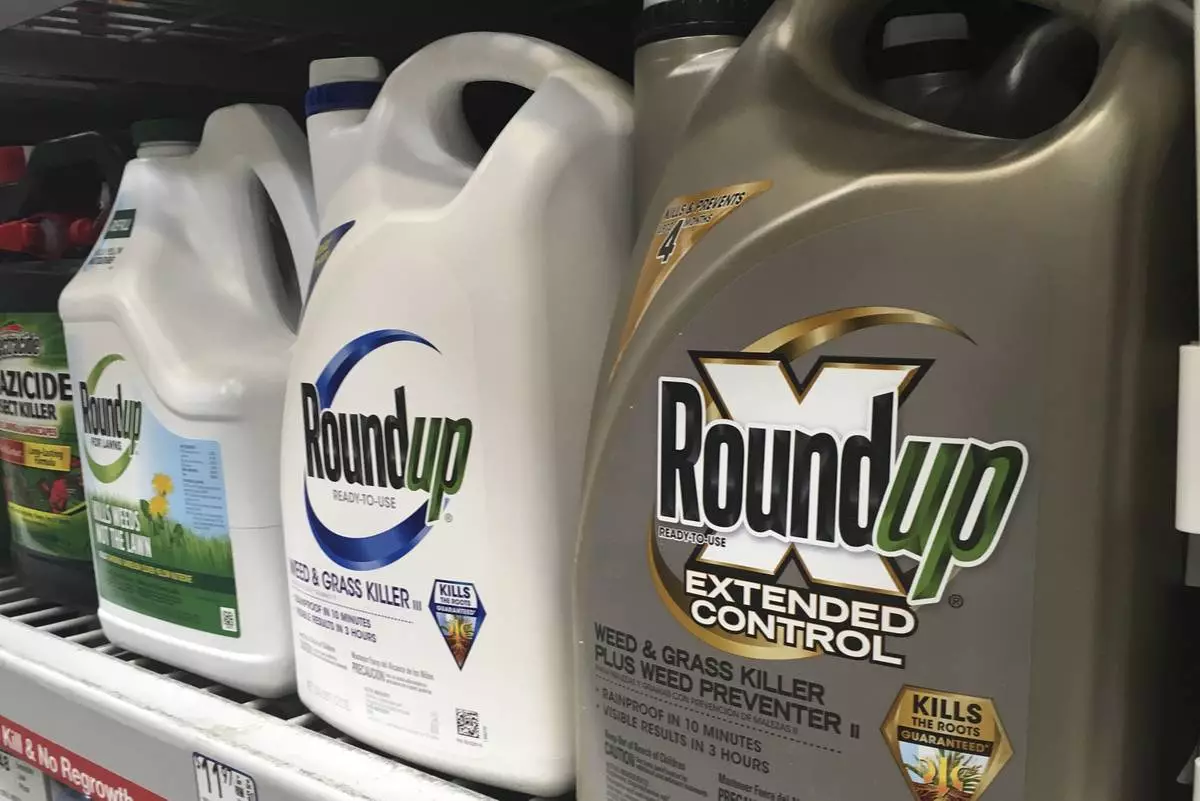The maker of a permanent contraceptive implant subject to thousands of injury reports and repeated safety restrictions by regulators said Friday that it will stop selling the device in the U.S., the only country where it remains available.

This image provided by Bayer Healthcare Pharmaceuticals shows the birth control implant Essure. On Friday, July 20, 2018. (Bayer Healthcare Pharmaceuticals via AP)
Bayer said the safety of its Essure implant has not changed, but it will stop selling the device at the end of the year due to weak sales.
The German company had billed the device as the only non-surgery sterilization method for women. As complaints mounted and demand slipped, it stopped Essure sales in Canada, Europe, South America, South Africa and the United Kingdom.
The U.S. Food and Drug Administration has placed multiple restrictions on the device following patient reports of pain, bleeding, allergic reactions and cases where the implant punctured the uterus or shifted out of place.
In May, the FDA said doctors must show women a checklist of the device's risks before implanting it.
More than 16,000 U.S. women are suing Bayer over Essure.
One of them, Amanda Rusmisell, of Charlotte, North Carolina, said she's "immensely thrilled" by Bayer's action. Rusmisell said she got the device in 2008 and developed severe pain and bleeding. She took part in patient-organized rallies accusing Bayer for not disclosing potential risks and said, choking back tears, "Our very grassroots effort has worked."
Bayer received FDA approval to sell Essure in 2002 and promoted it as a quick and easy permanent solution to unplanned pregnancies. Essure consists of two thin-as-spaghetti nickel-titanium coils inserted into the fallopian tubes, where they spur the growth of scar tissue that blocks sperm from fertilizing a woman's eggs.
Because of the reported complaints, the FDA added its most serious warning to the device in 2016 and ordered the company to conduct a 2,000-patient study.
FDA Commissioner Scott Gottlieb said Friday the agency would work with Bayer to continue the study, but noted "Bayer will not be able to meet its expected enrollment numbers" for new patients. The study was designed to follow patients for three years to better assess complications.
More than 750,000 women worldwide have received Essure. Demand has declined in recent years and plunged 70 percent after the 2016 boxed warning, the FDA said.
Gottlieb said the FDA will continue to monitor adverse events reported to its database after Essure is removed from the market.
"I also want to reassure women who've been using Essure successfully to prevent pregnancy that they can continue to do so," he said. Those who think it's causing problems, such as persistent pain, should consult with their doctors, Gottlieb added.
Essure's original label warned that the device's nickel can result in allergic reactions. Its current labeling lists hives, rash, swelling and itching as possible reactions.
But many women have attributed other problems to the implant, including mood disorders, weight gain, hair loss and headaches. Those problems are listed in the current FDA labeling for the device, with the qualifier: "It is unknown if these symptoms are related to Essure or other causes."
Informational material Bayer supplied to doctors and patients lists potential problems and says the devices are meant to be permanent. It also says removal may require complicated surgery, including a hysterectomy, that might not be covered by insurance.
Gottlieb noted that device removal "has its own risks."
Diana Zuckerman, president of the nonprofit National Center for Health Research, said Essure is among medical devices approved without "clear evidence of safety or effectiveness."
"As a result, when thousands of women reported serious complications from Essure, there was no unbiased long-term research to refute or confirm those reports," Zuckerman said. "If patients had been listened to when the first clinical trials were conducted on Essure, better research would have been conducted to determine exactly how safe and effective Essure is."
Dr. Kristyn Brandi, a Los Angeles family planning specialist, called Bayer's move disappointing. She says most of her Essure patients have been satisfied.
"I would hope Bayer would use this opportunity to think about future research and product development," Brandi said. "Being able to offer women contraception that's permanent without surgery is a really great option."
Bayer spokeswoman Courtney Mallon said the company had no plans to re-design the device.
Kate Nicholson, of Dallas, got an Essure implant last year after she and her husband decided not to have children. She said she sympathizes with women who have had problems but said ending Essure sales is the wrong move.
"Pulling it from the market is yet another way to limit our choices about our own bodies," Nicholson said. "I personally always had horrible experiences with different versions of 'the pill,' but it's still on the market and many women swear by it."
DES MOINES, Iowa (AP) — Stung by paying billions of dollars for settlements and trials, chemical giant Bayer has been lobbying lawmakers in three states to pass bills providing it a legal shield from lawsuits that claim its popular weedkiller Roundup causes cancer.
Nearly identical bills introduced in Iowa, Missouri and Idaho this year — with wording supplied by Bayer — would protect pesticide companies from claims they failed to warn that their product causes cancer, if their labels otherwise complied with the U.S. Environmental Protection Agency’s regulations.
But legal experts warn the legislation could have broader consequences — extending to any product liability claim or, in Iowa’s case, providing immunity from lawsuits of any kind. Critics say it could spread nationwide.
"It’s just not good government to give a company immunity for things that they’re not telling their consumers,” said Matt Clement, a Jefferson City, Missouri, attorney who represents people suing Bayer. “If they’re successful in getting this passed in Missouri, I think they’ll be trying to do this all over the country.”
Bayer described the legislation as one strategy to address the “headwinds” it faces. About 167,000 legal claims against Bayer assert Roundup causes a cancer called non-Hodgkin’s lymphoma, which Bayer disputes. The company has won some cases, settled many others but also has suffered several losses in which juries awarded huge initial judgments. It has paid about $10 billion while thousands of claims linger in court.
Though some studies associate Roundup's key ingredient with cancer, the EPA has regularly concluded it is not likely to be carcinogenic to humans when used as directed.
The costs of “defending a safe, approved product” are unsustainable, said Jess Christiansen, head of communications for Bayer's crop science division.
The legislation was introduced in targeted states pivotal to Bayer's Roundup operations and is at a different stage in each. It passed the Iowa Senate, is awaiting debate in the Missouri House and was defeated in Idaho, where this year's legislative session ended.
Farmers overwhelmingly rely on Roundup, which was introduced 50 years ago as a more efficient way to control weeds and reduce tilling and soil erosion. For crops like corn, soybeans and cotton, it’s designed to work with genetically modified seeds that resist Roundup’s deadly effect.
Missouri state Rep. Dane Diehl, a farmer who worked with Bayer to sponsor the legislation, cited concerns that costly lawsuits could force Bayer to pull Roundup from the U.S. market, leaving farmers to depend on alternative chemicals from China.
“This product, ultimately, is a tool that we need," said Diehl, a Republican.
Iowa Gov. Kim Reynolds, a Republican, said in an email the legislation maintains the integrity of the regulatory process and, without it, “Iowa risks losing hundreds of jobs” in Muscatine, an eastern Iowa city where Roundup is mostly produced.
The Associated Press is seeking public records on Bayer’s communications with governor's offices in Iowa, Missouri and Idaho.
Bayer, like other companies, hires lobbyists in states to advocate for its interests. The company backs this legislation in the states where “we have a big, direct economic impact,” Christiansen said.
Roundup’s key ingredient, glyphosate, is derived from phosphate mined in Idaho. And St. Louis is the headquarters of its North America crop science division, acquired in its 2018 purchase of Monsanto. Because of that, many of the lawsuits are filed in Missouri.
The five lobbyists registered for Bayer in Iowa and three in Idaho is largely consistent with recent years, but the number working in Missouri this year ballooned from four to nine. Lobbyist expenditures exceeded $8,000 in Idaho this year; similar information was not available in Iowa or Missouri.
Led by Bayer, a coalition of agricultural organizations called Modern Ag Alliance also is spending tens of thousands of dollars on radio and print advertisements claiming that trial lawyers and litigation threaten the availability of glyphosate.
On its website, the group asserts that at risk are 500 jobs connected to glyphosate production in Iowa, and 800 jobs in Idaho.
Bayer stopped short of threatening closures. The Iowa facilities, including in Muscatine, “are very critical facilities to our business, so we'll remain at some sort of support level,” Christiansen said.
At issue in the lawsuits and legislation is how Bayer – and any other pesticide company — communicates with consumers about the safety of its products.
Companies are required to register products with the EPA, which evaluates — and then reevaluates every 15 years — a pesticide and its label. The EPA reiterated in 2020 that glyphosate used as directed posed no health risks to humans. But a federal appeals court panel in 2022 ruled that decision “was not supported by substantial evidence” and ordered the EPA to review further.
The debate over glyphosate escalated when a 2015 report by the International Agency for Research on Cancer, part of the World Health Organization, said it's “probably carcinogenic to humans" based on “limited” evidence of cancer in people and “sufficient” evidence in study animals.
Based on that international report, California sought to add a cancer warning label to products containing glyphosate. But a federal appeals court ruled against California last November, concluding such a warning wasn't factual.
Christiansen emphasized that many regulatory agencies worldwide agree with the EPA and insisted Bayer has to stick to EPA labeling to ensure it isn't providing false or misleading information. She added that the company is transparent in the information it does provide.
Critics of the legislation aren't convinced, citing examples such as opioids and asbestos that had been deemed safe for use as directed — until they weren't.
There also are concerns that the legislation could stifle any product liability claim since most rely on the argument that a company failed to warn, said Andrew Mertens, executive director of the Iowa Association for Justice, an organization for trial lawyers.
Jonathan Cardi, a product liability and torts expert at Wake Forest University School of Law, also said a strict reading of the Iowa legislation extends beyond liability claims, and “the way it’s drafted makes it interpretable to mean nobody could bring any suit.”
In lobbying lawmakers and in speaking with the AP, Bayer representatives disputed that the legislation would cut off other legal actions. Several legal experts said the legislation is unlikely to affect the 18,000 lawsuits already pending in Missouri’s capital of Jefferson City, and wouldn’t prevent claims in states that don’t adopt similar legislation.
In Idaho, the Republican-led Senate narrowly defeated the bill amid concerns about relying on federal agencies' safety standards and limiting the ability of harmed individuals to sue.
John Gilbert, who farms in Iowa Falls, Iowa, with limited use of Roundup, called Republicans hypocritical for attempting to protect corporate interests after campaigning on standing up for Iowans.
The bill “invites a lot of reckless disregard," said Gilbert, who is on the board for the Iowa Farmers Union. “No amount of perfume’s gonna make it anything but a skunk."
Lieb reported from Jefferson City, Missouri.

FILE - Soybeans are seen in a field on a farm, Friday, Sept. 2, 2016, in Iowa. The maker of a popular weedkiller is turning to lawmakers in key states to try to squelch legal claims that it failed to warn about cancer risks. (AP Photo/Charlie Neibergall, File)

FILE - The Bayer AG corporate logo is displayed on a building of the German drug and chemicals company in Berlin, Monday, May 23, 2016. Bayer, the maker of a popular weedkiller, is turning to lawmakers in key states to try to squelch legal claims that it failed to warn about cancer risks. Bayer disputes such claims but already has paid about $10 billion to resolve them. (AP Photo/Markus Schreiber, File)

FILE - Phosphate ore is dug up and transported from Monsanto Company's South Rasmussen Mine site near Soda Springs, Idaho, July 16, 2009. Bayer acquired Monsanto in 2018. Bayer, the maker of a popular weedkiller, is turning to lawmakers in key states to try to squelch legal claims that it failed to warn about cancer risks. The company disputes such claims. A key ingredient of the weedkiller, glyphosate, is derived from phosphate mined in Idaho. (Bill Schaefer/The Idaho State Journal via AP, File)

FILE - Containers of Roundup are displayed on a store shelf in San Francisco, Feb. 24, 2019. Thousands of legal claims against drug and chemicals company Bayer assert Roundup causes a cancer called non-Hodgkin’s lymphoma, which Bayer disputes. (AP Photo/Haven Daley, File)

FILE - A soybean field is sprayed in Iowa, July 11, 2013. The maker of a popular weedkiller is turning to lawmakers in key states to try to squelch legal claims that it failed to warn about cancer risks. (AP Photo/Charlie Neibergall, File)













